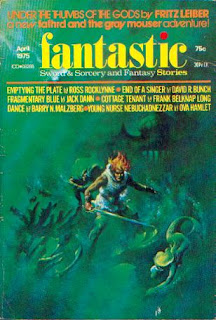In the Land of the Gods, in short in Godsland and near Nehwon's Life Pole there, which lies in the southron hemisphere at the antipodes from the Shadowland (the abode of Death), three gods sitting together cross-legged in a circle picked out Fafhrd and the Mouser's voices from the general mutter of their worshippers, both loyal and lapsed, which resounds eternally in any god's ear, as if he held a seashell to it.
the three gods singled out their voices ... because they were the most noteworthy worshippers these three gods had ever had and because they were boasting. For the gods have very sharp ears for boasts, or for declarations of happiness and self-satisfaction, or for assertions of a firm intention to do this or that, or for statements that this or that must surely happen, or any other words hinting that a man is in the slightest control of his destiny. And the gods are jealous, easily angered, perverse, and swift to thwart.
This is delightful stuff, in my opinion, full of both the wit and cynicism that are hallmarks of the tales of the Nehwon. In the span of just a couple of paragraphs, Leiber has painted a striking portrait of the gods of his fantasy setting. He goes on:
"It's them, alright – the haughty bastards!" Kos grunted, sweating under his furs – for Godsland is paradisal.
"They haven't called on me for years – the ingrates!" Issek with a toss of his delicate chin. "We'd be dead for all they care, except we've our other worshippers. But they don't know that – they're heartless."
"They have not even taken our names in vain," said Mog. "I believe, gentlemen, it is time they suffered divine displeasure. Agreed?"
Nehwon's gods, you can see, are petty and vain, not unlike the gods of ancient Greece or Clark Ashton Smith's Hyperborea. They bristle at being ignored – and are more than prepared to smite their wayward followers to assuage their feelings of abandonment. In this case, the three gods decide to make use of the Twain's plan to seek excitement in Lankhmar: "We will hunt girls – ourselves the bait!" in the words of the Mouser.
Mog said, smiling lopsidedly because of his partially arachnid jaw structure, "They seem to have chosen their punishment."
"The torture of hope!" Issek smiled eagerly, catching on. "We grant them their wishes –"
"– and then leave the rest to the girls," Mog finished.
"You can't trust women," Kos asserted darkly.
"On the contrary, my dear fellow," Mog said, "when a god's in good form, he can safely trust worshippers, female and male alike, to do all the work."
"Under the Thumbs of the Gods" is a fast-moving yarn that might, on first reading, seem fun but fairly insubstantial. In fact, I think it one of Leiber's most fascinating later stories. Not only do we learn a lot more about the gods of Nehwon, but we also learn a thing or two about Fafhrd and the Gray Mouser themselves, which is always worthwhile.


I have a similar affection for The curse of the smalls and the stars
ReplyDeleteI'd argue that an idea in this story - that gods are dependent on human worship for their power and even their survival - was key to Gary's (and AD&D 1E's) conception of gods in the game.
ReplyDeleteOther traits of Nehwon's gods (inability to hear thoughts, a dwelling place on the Prime Material Plane) not so much.
I love every bit of the feel of the Lankhmar stories. that is how D&D should feel, to me.
ReplyDeleteGene Wolfe's *Latro in the Mist* is an outstanding pairing with this tale.
ReplyDelete